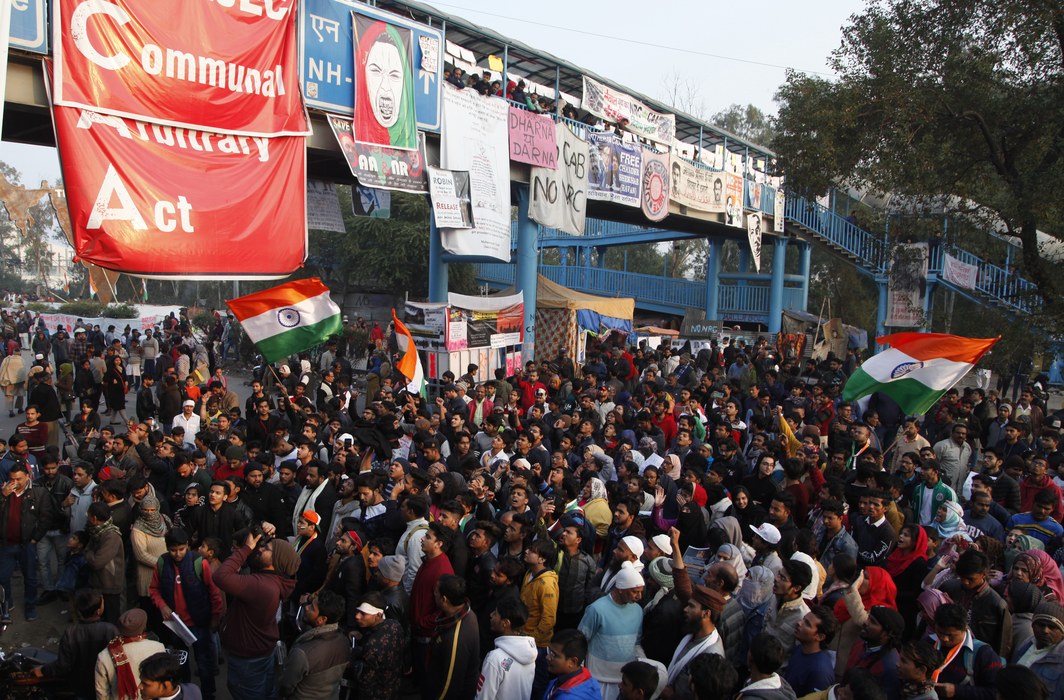Right of protest has to be balanced with right to commute says top court in its judgment
New Delhi (ILNS): The Supreme Court today pronounced its verdict on the right to protest and ruled that public places and roads cannot be occupied indefinitely by protesters. The judgment was delivered in response to a batch of pleas filed by the protesters, protesting against the contentious Citizenship Amendment Act (CAA), in the Shaheen Bagh area earlier this year.
A three-judge bench of Justices Sanjay Kishan Kaul, Krishna Murari and Hrishikesh Roy, while hearing the case, pulled up the Delhi Police for not doing its job under the pretext of having endless talks. “The police must ensure roads are cleared,” said the court.
Justice SK Kaul said: “We have referred to protests which were carried out across Delhi including in Shaheen Bagh. Shaheen Bagh produced no solution and the protestors were removed on account of the pandemic.”
The Bench made the following observations:
· Public places and roads can’t be occupied indefinitely
· Protests permissible only in designated areas
· Right to commute can’t be indefinitely curtailed.
· Right of protest has to be balanced with right to commute
“CAA has its own share of supporters and those who oppose it. Challenge to CAA is pending before this court separately. Attempts at mediation in Shaheen Bagh didn’t succeed but we don’t have any regrets. There can’t be a ban on public meetings but they have to be in designated areas. Constitution gives a right to protest, but it must be coupled with corresponding duties,” said the Court.
“Public spaces and places can’t be occupied indefinitely whether in Shaheen Bagh or elsewhere. The administration must keep such spaces free from obstructions, not wait to fire from court’s shoulder,” stated Justice Kaul.
On September 21 the Supreme Court, while referring to the protests, had said that there cannot be a “universal policy” on the right to protest. Also, the Supreme Court, while agreeing that citizens have a right to protest, pointed out that there are also other public rights such as the right to movement and mobility. Noticeably, the Supreme Court observed that the right to protest needs to be balanced with the right to movement of the public.
Advocate Amit Sahni primarily approached the Delhi High Court seeking directions to the police to ensure smooth traffic flow on the Kalindi Kunj-Shaheen Bagh road, where the protestors had blocked the road since December 15. The High Court sought the authorities to consider law and order a priority while dealing with the situation. Thereafter, Sahani approached the Apex Court earlier this year against the High Court’s order. It had sought supervision of the situation in Shaheen Bagh by a retired Supreme Court judge or a sitting judge of the Delhi High Court.
Solicitor General Tushar Mehta had contended that the petition(s) may not survive, provided the protest at Shaheen Bagh was over. But barring one petitioner, none of the others agreed to withdraw their petitions.
“God Almighty itself intervened. We have to balance right to protest and the blocking of roads. We have to deal with the issue. There cannot be universal policy as the situation may vary on case to case basis,” the Court had said earlier.
Advocate Amit Sahni, one of the lawyers who had filed the plea, said that, “This was allowed to continue for more than 100 days and people faced difficulty,” while adding on to his words he said, “This kind of incident should not have happened.”
Advocate Mehmood Pracha, appearing for an intervenor, had submitted that “some people from a political party went there and created riots.” He also contended: “We have the right to protest. State machinery is not sacrosanct. Members of a political party went there with the police and created the situation.”
SG Tushar Mehta in response had disagreed to the above contentions and had said that the right to protest cannot be “absolute”. In response, the apex court had observed that other public rights such as the right to movement and mobility also exist, and a balance needed to be drawn between these.
While reserving the judgment, the bench had previously maintained that it had appointed interlocutors to talk to the protestors as an experiment. It said the interlocutors gave suggestions on how to end the blockade.
The Shaheen Bagh protest against the passage of the contentious Citizenship (Amendment) Act started on December 14, 2019. The protest ended with the advent of Corona pandemic and imposition of national lockdown, after the protesters were removed by the police from the protest site on March 24.
Thereafter, the demonstrators wrote letters to the Chief Justice of India SA Bobde against their “forcible and vindictive removal” by the Delhi Police and sought a direction from the Supreme Court for citizens’ rights.
“Can a public road be blocked for a long time? When and where can protests be held? We will think about how it can be balanced,” the bench headed by Justice Sanjay Kishan Kaul remarked during the hearing of the case on September 21.
The CAA provides citizenship to refugees from six minority communities in Pakistan, Afghanistan and Bangladesh, who have entered India on or before December 31, 2014. The Act, passed on December 11, has been criticised for excluding Muslims. In December, at least 28 people died in protests against the Act, 19 of them from Uttar Pradesh itself. Most of those who died had suffered bullet-inflicted wounds.
-ILNS


